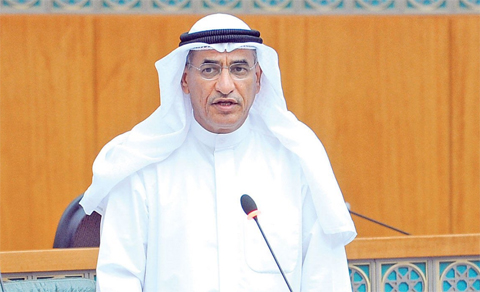Hajraf details state budget's final accounts in webcast
Minister of Oil and Minister of Electricity and Water Bakheet Al-RasheediKUWAIT: Minister of Oil and Minister of Electricity and Water Bakheet Al-Rasheedi said yesterday GCC states have prepared emergency plans in case the Strait of Hormuz was closed. Iran, in its row with the United States over sanctions, has threatened to block the Strait of Hormuz, a major strategic shipping route for oil from the region and the main route for Iranian crude exports. About 18.5 million bpd of oil or more than 30 percent of seaborne traded crude was transported in 2016 through the Strait of Hormuz, making the waterway at the southern end of the Gulf the most important oil transit channel in the world, according to US EIA figures. The strait, which is about 54 km wide at its narrowest point, separates the Arabian Peninsula from Iran.
In a press statement during his tour of southern Al-Zour power station, Rasheedi also expressed optimism on resuming oil production in the neutral zone with Saudi Arabia. As for importing natural gas from Iraq, Rasheedi expected the two sides to reach an agreement on the issue before end of 2018. Meanwhile, he said that Kuwait was never asked to increase production to offset any shortage of Iranian oil supply due to US-imposed sanctions on the country. Kuwait's main concern is the stability of markets, the minister said, adding that the country is able to provide the needed amount of crude oil for these markets.
Separately, Finance Minister Nayef Al-Hajraf revealed the state budget's final statement of accounts for the fiscal year ending March 31, 2018 in a live web conference involving local and global business communities. The initiative reflects the Kuwaiti financial apparatus' determination to share monetary information in a clear and transparent manner, as well as its desire to engage the business community, the finance ministry said in a statement.
The ministry said the webcast brought together more than 70 financial institutions from around the world, all of whom listened intently as Hajraf explained the intricacies of the state budget's final accounts. The participants were also allowed to field questions ranging from the last fiscal year's performance to existing economic policies in Kuwait, the statement added.
The ministry had previously revealed that the fiscal deficit dropped by 18.1 percent by the end of the last fiscal year, while non-oil revenues surged by 21.7 percent. Meanwhile, oil revenues stood at KD 14.3 billion (around $47 billion), up 22.2 percent from last year, while total revenues increased by 22.1 percent from last year to reach KD 16 billion ($52.7 billion). The fiscal year in Kuwait starts on April 1 of each year and ends on March 31 of the following year. - KUNA





